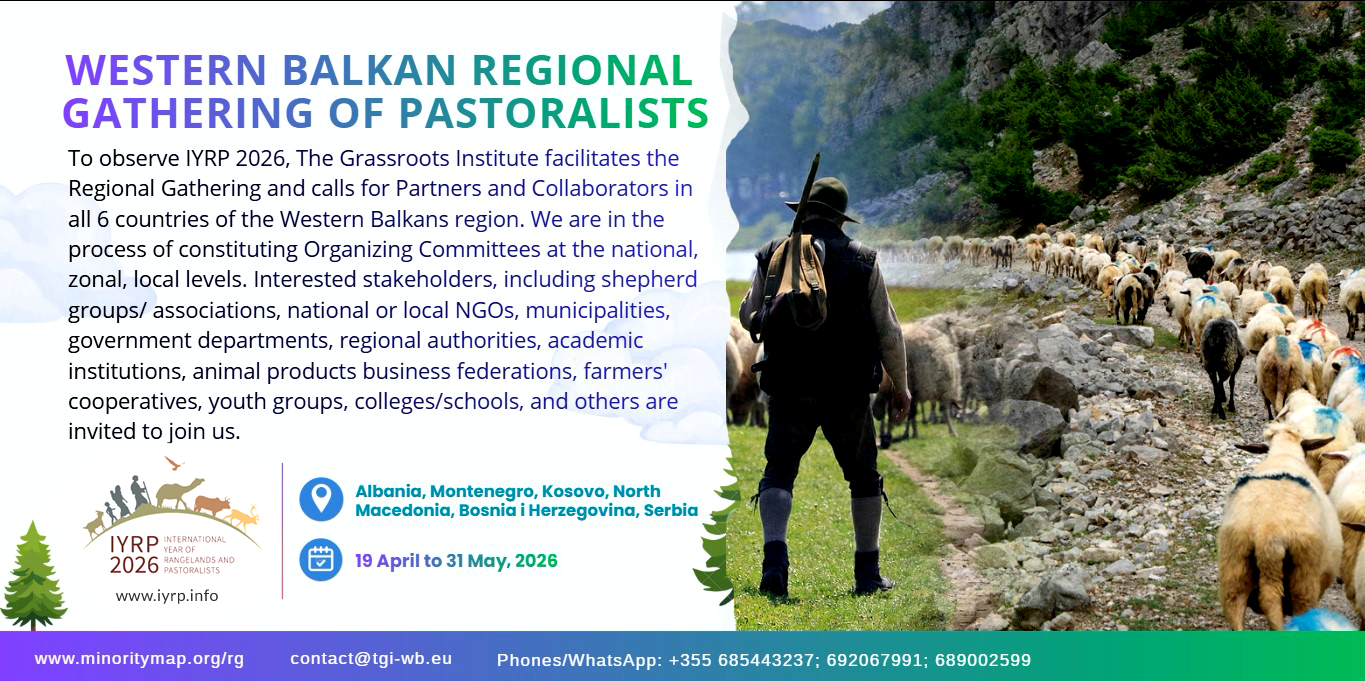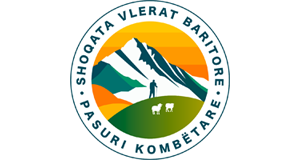
IYRP | Western Balkan Regional Gathering of Pastoralists
19 April 2026 to 31 May 2026
Given the global momentum under IYRP 2026, the shared challenges and rich heritage of pastoralism in the Western Balkans, a Regional Gathering of Pastoralists in Shkodër on 25-26 April 2026 offers a strategic opportunity to strengthen pastoralist resilience, voice, and sustainability. It can catalyze regional cooperation, inform policy, mobilize funding, and help ensure that pastoralists are recognized as key partners in sustainable land‐use, grazing resources management, ecosystem conservation, climate adaptation, and cultural heritage protection. The following sections are worth reading to understand and comprehend the full contexts.
1. The Context: IYRP & Global Recognition
The United Nations General Assembly has declared 2026 the International Year of Rangelands & Pastoralists (IYRP), recognizing that rangelands and pastoralist communities are vital globally for sustainable livelihoods, food security, ecosystem health, cultural heritage, and as nature-based solutions in the context of climate change. The IYRP Global Alliance has outlined goals for 2026 including: increasing public awareness of the societal value derived from rangelands and pastoralists; promoting pastoralist knowledge, innovation and coalition‐building; advocating for sound, evidence‐based policy; and fostering ethical investment in pastoralist livelihoods. Further information can be accessed from www.iyrp.info
2. Pastoralism in Western Balkans
The pasturelands in Western Balkan region, especially in Albania, Montenegro, Kosovo, North Macedonia, Serbia and Bosnia & Herzegovina, hold ecological, cultural, and economic significance, yet they are increasingly under pressure from environmental degradation, socio-economic change, and governance challenges. These lands not only supply food, fiber, and ecosystem services but are deeply embedded in local culture and livelihood strategies. The Western Balkans have significant pastoralist populations or traditions (transhumance, seasonal grazing, common pasture lands), but these communities face multiple challenges.
The Value of Pastoralism and Rangeland Commons: Mobile pastoralists manage pastureland commons in ways that are very efficient in resource use, producing high-nutrient foods and other vital products with relatively little financial investment. What is often assumed to be “wilderness” or “unused land” is in fact a managed, dynamic ecosystem shaped by unique heritage of shepherd people. The lifestyles of pastoralists are not incidental; they are central to maintaining the landscapes themselves. The grazing practices, seasonal migration, livestock management, and social norms together form a system that often enhances rather than degrades mountain pastures. Recognition of pastoralists’ rights means protecting these biocultural resources.
Challenges to Pastoralist Rights: Many agrarian, land, and conservation laws do not adequately cater to pastoral modes of life. Policies may treat grazing in protected areas or common lands as threats rather than legitimate livelihood systems, imposing restrictions, enclosures, or land use changes without due recognition of pastoralist people’s interests. “Deep ecologists” or strict environmental protection paradigms frequently view all grazing in natural ecosystems — even traditional grazing — as interference or harm. This leads to policies that displace pastoralists, restrict livestock mobility, or deny Shepherds’ rights to use lands that their ancestors have used. Moreover, although pastoralists produce highly nutritious foods and other rangeland products, they are often inadequately rewarded in markets. The economic system may undervalue their products and overvalue more intensive, settled livestock rearing, contributing to disincentives to maintain mobile pastoralism.
Why Recognition of Rights is Essential: Traditional pastoralist systems include practices tuned to local ecologies — knowing migration routes, timing grazing to forage cycles, managing herd sizes, etc. These practices can be integral to preventing overgrazing, soil erosion, loss of biodiversity, and habitat degradation. Recognizing rights means enabling pastoralists to continue deploying this knowledge. In addition, pastoralist systems are inherently adaptive. Recognizing rights enables herders to use mobility, local forecasting, and traditional practices to respond to climate variability. Without secure rights, pastoralists are often constrained and lose adaptive options. Furthermore, many pastoralist communities are marginalized in policy debates, legal frameworks, or economic decisions. Recognition of their rights is a matter of justice: land tenure, legal protection, and inclusion enable them to sustain their culture and livelihoods for future generations.
Toward Policy & Legal Recognition: Existing legal frameworks must be reviewed and changed where they restrict pastoralist mobility, tenure, or customary rights. Conservation laws should accommodate sustainable grazing as part of ecosystem maintenance rather than excluding pastoralists. Thus, pastoralists themselves must be part of the conversation movement — in defining land rights, in managing protected areas, and in local and regional decision-making. Capacity-building efforts should help pastoralists engage in legal, ecological, and market systems. Changing public perceptions — particularly among conservationists and regulators — to see pastoralism not as a threat but as an asset is essential. Ensuring that pastoralists’ products are fairly priced, infrastructures like veterinary services adapted to mobile systems, and technologies (e.g. for communication, monitoring) aligned with pastoralist logic can enhance both conservation and livelihoods.
3. Why Regional Gathering in the Western Balkans?
- Shared Challenges across the Region
- Land tenure & access to pasture: Many pastoralists depend on communal or traditional grazing lands. Laws or policies may not adequately recognize customary or transboundary rights, leading to uncertainty and conflict over land, pasture, water.
- Transhumance and Mobility: Mobility (seasonal migration, transhumance) is often essential for pastoralist adaptation to variable climates. Climate change is increasing the rate of extreme weather (drought, heat, scarce grazing), making mobility and water access even more critical.
- Policy invisibility / marginalization: Pastoralists are often under‐represented in decision‐making, in national or regional policy, and their voices are not fully heard in land-use planning, environmental regulation, or rural development programs.
- Hostile market: Pastoralist value‐chains (for livestock, milk, wool, artisanal products) often suffer from weak infrastructure, poor value‐chain integration, or lack of access to markets. Modern market imposes alien standards on the shepherds to produce matching quality products, which become hard to comply with.
- Cultural heritage & knowledge loss: Transhumance, seasonal grazing patterns, traditional knowledge of pasture management, biodiversity protection, and customary governance systems are part of the cultural fabric. Globalization, urban migration, tourism, demographic changes and state disenfranchisement threaten them.
- Opportunities & Strategic Advantages of a Regional Gathering
- Peer learning and networking: A gathering allows pastoralists from different Western Balkan countries to share experiences, strategies, innovations. For example, how to negotiate pasture rights, manage grazing sustainably, cope with climate stress, add value to their products.
- Strengthening pastoralist organizations & coalitions: Bringing together pastoralist groups, NGOs, researchers, academics, and authorities regionally can foster stronger, more unified advocacy and collaboration. It helps build a regional support group in line with IYRP’s RISGs Europe.
- Informing policy & raising visibility: A regional gathering can generate region‐specific policy recommendations, bring visibility to pastoral livelihoods at national and regional levels, contribute to aligning national legislation with international frameworks (e.g. IYRP, FAO, UNCCD) that support sustainable rangelands and pastoralism.
- Influencing government attitudes: The voices raised by shepherds from different corners of all the countries will fuel to strengthen the advocacy and lobbying with the government ministries and institutions. Intended changes in the attitudes of government apparatus will dilute numerous issues confronted by the shepherds.
- Mobilizing funding and support: With an event in April 2026 aligned with IYRP 2026, attention from donors, governments, and international agencies is heightened. A regional gathering can help attract resources — technical, financial and manpower — for pastoralist training, infrastructure (water, veterinary services, markets), restoration of degraded pastures, and so on.
4. Expected Outcomes
A well‐organized Regional Gathering should aim for outcomes such as:
- A regional DECLARATION or set of policy recommendations for Western Balkan pastoralism (on land tenure, mobility, market access, climate resilience, preservation of cultural assets, and protection of traditional knowledge of shepherds).
- Strengthening capacity of pastoralist groups to document and advocate for their rights, protect traditional ecological knowledge, and engage with pastures’ conservation.
- Creation and reinforcement of a Western Balkan RISG (Regional IYRP Support Group) to coordinate regional pastoralist voices & initiatives.
- Partnerships formed between pastoralist communities, academia, government bodies, NGOs, trade networks, and potential donors.
- Proposals or project outlines for investment in pastoral infrastructure (water resources, vet services, value addition, internet, affordable transport, cooperatives), climate adaptation (fodder innovations, grazing planning), cross‐border cooperation where applicable.
- Increased awareness among policymakers, media, and public about the importance and challenges of pastoralism in the Western Balkans.
- Ensuring pastoralist communities are included in national / regional policy agendas contributes directly to multiple Sustainable Development Goals (SDGs): no poverty, zero hunger, gender equality, climate action, life on land, etc.
- Cultural identity, heritage, and community cohesion — especially important in mountainous, less‐connected areas — benefit from gatherings that validate pastoralist life and inter‐community relations.
5. Key Aspects for Organising Successfully
To make the Gathering impactful, attention needs to be paid to:
- Ensuring pastoralists themselves have central roles in planning, agenda‐setting, facilitation (not just as invitees).
- Inclusivity: women pastoralists, youth, minority groups, cross‐border and mobile groups.
- Thematic focus: land rights and tenure; transhumance and mobility; climate resilience; market (development) linkages; biodiversity & ecosystem; customary versus formal governance; defence from destructive projects e.g. tourism, hydropower, etc.
- Documentation and dissemination: capture case studies, success stories; produce policy briefs; social media posts; follow up.
- Resource planning: logistics, translation, travel support for remote pastoralists, accommodations.
- Social media and promotion: a group of volunteers should be engaged to create and disseminate the content on regular basis.
- Filming: during the pre-gathering and during gathering events, important parts should be filmed to produce a documentary, and to make teaching-learning resource.
6. Pre-Gathering, During Gathering and Post-Gathering Events
- Pre-Gathering:
- Constitution of Organizing Committee and Teams, and Preparatory Meetings
- Perspective Building Workshops
- Formation of Local/National Groups
- Signature Campaign
- Public Hearings
- During Gathering:
- Speeches / Voices
- Human Chain
- Cultural Activities
- Food Sharing
- Western Balkan Declaration
- Meeting Ministers, Supreme Court, and High Institutions and submitting the Declaration
- Posting Declaration across the world
- Post-Gathering:
- Preparation for Global Gathering
- Participation in Global Gathering
- Bilateral Dialogue – Ministry / Shepherds’ Delegation
- Other Follow Up Activities
7. Regional Gathering’s Principal Themes [in accordance with IYRP WG Themes]:
- Land Rights, Access to Resources and Mobility of Livestock
- Ecological Restoration and Water Resources
- Gender Mainstreaming and Integration
- Pastoral Economy, Product Development and Marketing
- Adaptation to Climate Change
- Grassland and Biodiversity Protection
- Youth Participation and Transfer of ITK
- Preservation of Biocultural Heritage
- Human Rights of Shepherd People
- Law and Policy Reform
8. Contacts of Key Members of Regional Facilitation Team
- Chief Facilitator & Global Affairs Coordinator: Dr. Hasrat Arjjumend [harjjumend@gmail.com +91 9868993710]
- WB Regional Coordinator & Volunteers Program Coordinator: Martine Wolff [martine.wolff@yahoo.com +355 68 544 3237]
- Regional Coordinator – Municipalities & Institutional Mobilization: Dr. Petrit Dobi [dobipetrit@gmail.com +355692067991]
- Regional Coordinator – Academic Networking & Veterinary Services: Dr. Luigji Turmalaj [luigjturmalaj@ymail.com +355 68 900 2599]
- Regional Coordinator – Media & Communication: Philippe Bertinchamps [philippebertinchamps@hotmail.com + 381 637631018]
- National Coordinator – Kosovo: Dr. Blerta Mehmedi Kastrati [blerta.mehmedi@uni-pr.edu +383 44 283 346]
- National Coordinator – North Macedonia: Dr. Merije Elezi [merije.elezi@unite.edu.mk +389 72779118]
Western Balkans Regional Gathering of Pastoralists | 19 April 2026 to 31 May 2026
Calendar of Key Events (*locations and dates are provisional)
| 19 April 2026 |
Regional Gathering – Shkodër Zone [Albania] |
Location: Shkodër |
| 26 April 2026 |
Regional Gathering – Elbasan Zone [Albania] |
Location: Elbasan |
| 29 April 2026 |
Regional Gathering – Diber Zone [Albania] |
Location: Peshkopi |
| 3 May 2026 |
Regional Gathering – Andrijevica Zone [Montenegro] |
Location: Andrijevica |
| 8 May 2026 |
Regional Gathering – Peja Zone [Kosovo] |
Location: Peja |
| 13 May 2026 |
Regional Gathering – Prizren Zone [Kosovo] |
Location: Prizren |
| 15 May 2026 |
Regional Gathering – Tetovo Zone [North Macedonia] |
Location: Tetovo |
| 17 May 2026 |
Regional Gathering – Gostivar Zone [North Macedonia] |
Location: Gostivar |
| 19 May 2026 |
Regional Gathering – Kukës Zone [Albania] |
Location: Kukës |
| 22 May 2026 |
Regional Gathering – Lezha Zone [Albania] |
Location: Lezhe |
| 30-31 May 2026 |
Concluding Assembly of the Representatives of Pastoralists – WB |
Location: Shkodër |
Read the Key Information
Regional Organizing Committee
Contact the Members


 Global Alliance for Rangelands & Pastoralists
Global Alliance for Rangelands & Pastoralists Rural Association Support Programme
Rural Association Support Programme Adad Malore
Adad Malore Shoqata Vlerat Baritore – Pasuri Kombëtare
Shoqata Vlerat Baritore – Pasuri Kombëtare